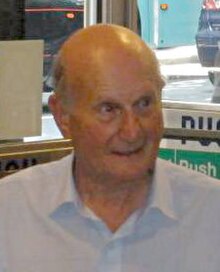Gerry Anderson
|
Gerry Anderson MBE |
|
|---|---|

Anderson in 2009
|
|
| Born |
Gerald Alexander Abrahams 14 April 1929 Bloomsbury, London, England, UK |
| Died | 26 December 2012 (aged 83) Oxfordshire, England |
| Cause of death | Alzheimer's disease |
| Occupation | Film producer, television producer, writer, director |
| Years active | 1957–2012 |
| Employer | Lew Grade (1961–76) |
| Organization | AP Films, Century 21, Group Three, Anderson Burr, Gerry Anderson Productions, Anderson Entertainment |
| Known for | Fireball XL5, Stingray, Thunderbirds, Captain Scarlet, UFO, Space: 1999, Terrahawks, Joe 90 |
| Home town | Kilburn and Neasden, London |
| Spouse(s) |
Betty Wrightman (m. 1952; div. 1960) Sylvia Anderson (m. 1960; div. 1980) Mary Louise Robins (m. 1981; his death 2012) |
| Children | 4 |
| Parent(s) | Joseph Abrahams (later Anderson) Deborah Abrahams (later Anderson; née Leonoff) |
| Website | www |
Gerry Anderson, MBE (born Gerald Alexander Abrahams; 14 April 1929 – 26 December 2012) was an English television and film producer, director, writer and occasional voice artist. He remains famous or his futuristic television programmes, especially his 1960s productions filmed with "Supermarionation" (marionette puppets containing electric moving parts).
Anderson's first television production was the 1957 Roberta Leigh children's series The Adventures of Twizzle. Supercar (1961–62) and Fireball XL5 (1962) followed later, both series breaking into the US television market in the early 1960s. In the mid-1960s Anderson produced his most successful series, Thunderbirds. Other television productions of the 1960s include Stingray and Captain Scarlet and the Mysterons.
Anderson also wrote and produced several feature films whose box office performance was unexceptional. Following a shift towards live action productions in the 1970s, he had a long and successful association with media impresario Lew Grade and Grade's company ITC, continuing until the second series of Space: 1999.
After a career lull when a number of new series concepts failed to get off the ground, his career began a new phase in the early 1980s when audience nostalgia for his earlier Supermarionation series (prompted by Saturday morning re-runs in Britain and Australia) led to new Anderson productions being commissioned. Later projects include a 2005 CGI remake of Captain Scarlet entitled Gerry Anderson's New Captain Scarlet.
...
Wikipedia
